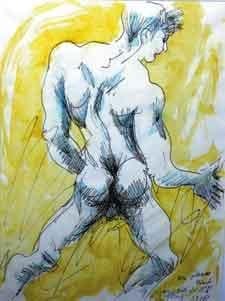
Playwright Alistair Newton (left) interviewed Peter Flinsch late last year. Flinsch died on Mar 30.
UPDATE 31 MAR 2010 – Peter Flinsch died on Mar 30 in Montreal at at the age of 90. Click on the control below to hear some of Flinsch’s conversation with Newton.
25 MAR 2010 – Peter Flinsch was born in Leipzig, Germany, in 1920. He grew up surrounded by his family’s collection of Dutch Masters and Italian Renaissance masterworks. He travelled frequently as a child, receiving a classical education at prestigious private boarding schools. But after the collapse of the Weimar Republic and the Nazi seizure of power in 1933, he was forced into the Hitler Youth and then into the anti-aircraft division of the Luftwaffe.
In 1942, he was arrested for kissing a boy at a Luftwaffe Christmas party. He was court-martialled and imprisoned for violating Paragraph 175, Germany’s anti-gay law.
After the war, Flinsch briefly returned to Leipzig and took a job painting official portraits for the local branch of the Communist Party. He honed his craft as a visual artist, creating state-approved images of party luminaries like Marx and Lenin.
He eventually immigrated to Montreal, which is where I visited him in January. He’s lived in the same apartment since 1968, and it’s a fantastic museum. Photos of some of his favourite models — gorgeous naked men — gaze from the walls. Scrapbooks sit on low shelves. Peter’s home studio is stacked nearly to the rafters with canvases and framed works; bursting sketchbooks sit on the worktable — truly a testament to a prolific working artist.
Peter, now 89, marched at the Nuremberg Rally, met Hitler twice, threw a party for Jean Cocteau, co-founded the Vancouver Ballet and experienced the birth of Montreal’s gay community. He has been a theatre designer, visual artist and proud witness to gay history in the 20th century.
Alistair Newton: Were exhibitions of your work ever shut down because they were considered obscene?
Peter Flinsch: Oh yes, sure, that happens, but I don’t care. I don’t mind. When somebody buys a piece of my work, I know there’s no censorship. They like it, you know. Money talks.
AN: When you gained some fame for your work, did you use that opportunity to talk about gay rights?
PF: Well, of course, the very fact that I exist and the things that I make exist, is a fact, you know.
AN: Yeah, there’s something inherently political about the fact that those images were made.
PF: Yeah, what they say in French is a fait accompli. I mean, nobody would say while looking at my work, “Oh god, is he gay?” I’ve been past that point fortunately.
AN: Do you consider yourself to be a survivor of the Holocaust?
PF: Oh yes, I’m healthy, I’m lucky. I can always say I’m very, very lucky. Luck has always been a wonderful thing. I can’t count on it, but it is — I’m blessed.

 Why you can trust Xtra
Why you can trust Xtra


